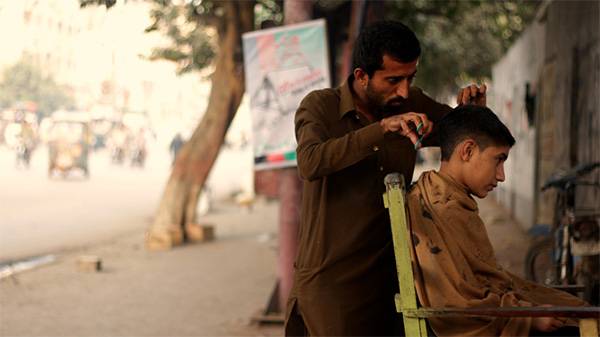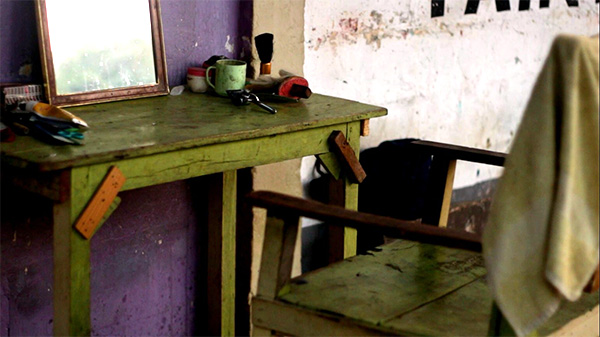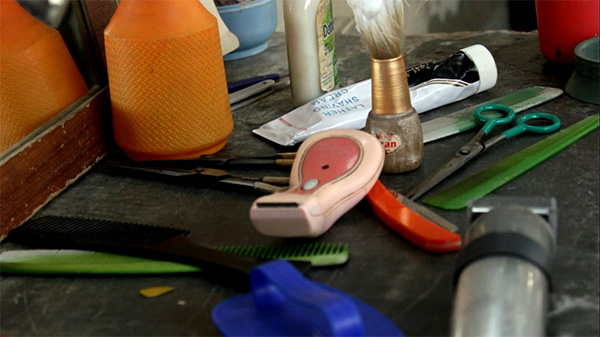
Allah Ditta meticulously trims the boy’s hair as the young customer gives instructions on the kind of haircut he wants. A middle-aged man waits under the tree to get his nails cut. The boy gets up to leave, handing Ditta Rs. 40 – the actual charges are Rs. 50 but the rate is negotiable depending upon the customer’s pocket. At a little distance, on the same footpath, is another barber. He has his own loyal customers waiting their turn on the nearby bench.
Situated in the heart of Soldier Bazaar, Ditta’s business is surrounded by the hustle and bustle of Karachi. His setup is on a footpath next to a busy road – meaning it can easily be spotted. Men stop their motorbikes midway when they see the street barbers. Other customers consist of those who work in the nearby mechanic shops or have their own stalls. “We operate on public holidays and even on strikes as the influx of customers is higher on those days,” Allah Ditta says. He caters to the working class who come for haircuts or to have their shave done during lunch breaks or holidays.
Street barbers, locally known as nayee/hajjam continue to serve as an integral part of the backdrop to life in Karachi. Men come from different parts of the city for all kinds of grooming. There is a notion that this particular business is part of a dying culture, perhaps similar to other ventures whose reign has expired – this is far from the truth.
The street barber is one of the oldest professions to exist, especially in South Asia. As part of the Islamic ritual known as Aqiqa, a newborn’s head must be shaved off in the first seven days. The nayyees are multipurpose craftsmen and they assist in carrying out this ritual. Thus, this gives them a religious edge and makes their profession a noble one. Besides cultural significance, street barbers still tend to be a lot of people’s preference as they charge a much lower price than the more upscale barbers’ shops – and can be found all around the city. Moreover, their service is quick and convenient and that in of itself draws them a huge clientele.
In recent times, new salons targeting the male audience have emerged. The likes of Rose Men Salon cater to the ongoing trend where men are becoming very concerned about the details of their physical appearance and tend to pay attention to grooming demands. In the past, this was considered a ‘ladies’ trait – and strictly a feminine necessity.
“Men often inquire about facials. I tell them to purchase the ingredients and I will do the job,” explains Allah Ditta. Those who can afford to pay extra for the commute or who are shy prefer to have the facial done inside their homes. Customers are hesitant to get a facial done on the footpath – still conforming to constricted gender roles in the society.

A variety of hairstyles have emerged including: scissor cut, fouji cut, and spice cut. Young men often carry photographs of their favourite actors, wanting to replicate their look. “Some customers ask me to carve a heart shape or other designs on the back of the head, similar to the actor Amir Khan in film Ghajini,” another barber, Sharafat Ali, informs me. “I learn about trends from the young lads and remember them, because the next boy wants the exact same thing!” he chuckles.
Gone are the days when street barbers were there just to make ends meet. Now there is innovation; identifying the different needs of customers and adapting to the current times and shifting gender norms. Perhaps all these factors signify why street barbers are still relevant in Pakistan.
Hygiene is repeatedly criticised when talking about street barbers. It is presumed that the barbers reuse blades, contributing to the spread of diseases such as Hepatitis B, HIV etc. “We use new blades for every customer – the monthly supplies are purchased from Boulton or Empress Market,” Ali says. Due to the local razor brands in the market, blades are available at cheap prices.

The street barbers operate their business on public space – meaning they face trouble with the police and local political party workers. “First the police used to bother us, demanding extortion money. Knowing well that we cannot afford to pay, they come to get a haircut and leave without paying. This does not bother me and we gladly do it,” Ditta says. “They capitalize on our vulnerability and by not paying for the haircut, they let us know loud and clear who the boss is.”
When he was younger, Ditta worked in a small neighbourhood’s barber shop. But he had a desire to start his own. “Reprimands by the police and party workers is common, however at the end of the day it’s my own business,” Ditta says. “My brother still works at the barber shop, but here I am!” he smiles coyly.
As the call for Maghrib prayer is heard, Allah Ditta packs up, ready to go home. The street barbers are keeping alive an old tradition adding to the city’s cultural value. “Rich or poor, both need hair grooming,” says Allah Ditta matter-of-factly. The demand for hair grooming prevails and the street barbers continue to supply the common people with an affordable solution.
Situated in the heart of Soldier Bazaar, Ditta’s business is surrounded by the hustle and bustle of Karachi. His setup is on a footpath next to a busy road – meaning it can easily be spotted. Men stop their motorbikes midway when they see the street barbers. Other customers consist of those who work in the nearby mechanic shops or have their own stalls. “We operate on public holidays and even on strikes as the influx of customers is higher on those days,” Allah Ditta says. He caters to the working class who come for haircuts or to have their shave done during lunch breaks or holidays.
Street barbers, locally known as nayee/hajjam continue to serve as an integral part of the backdrop to life in Karachi. Men come from different parts of the city for all kinds of grooming. There is a notion that this particular business is part of a dying culture, perhaps similar to other ventures whose reign has expired – this is far from the truth.
"Some customers ask me to carve a heart shape or other designs on the back of the head, similar to the actor Amir Khan in the film Ghajini"
The street barber is one of the oldest professions to exist, especially in South Asia. As part of the Islamic ritual known as Aqiqa, a newborn’s head must be shaved off in the first seven days. The nayyees are multipurpose craftsmen and they assist in carrying out this ritual. Thus, this gives them a religious edge and makes their profession a noble one. Besides cultural significance, street barbers still tend to be a lot of people’s preference as they charge a much lower price than the more upscale barbers’ shops – and can be found all around the city. Moreover, their service is quick and convenient and that in of itself draws them a huge clientele.
In recent times, new salons targeting the male audience have emerged. The likes of Rose Men Salon cater to the ongoing trend where men are becoming very concerned about the details of their physical appearance and tend to pay attention to grooming demands. In the past, this was considered a ‘ladies’ trait – and strictly a feminine necessity.
“Men often inquire about facials. I tell them to purchase the ingredients and I will do the job,” explains Allah Ditta. Those who can afford to pay extra for the commute or who are shy prefer to have the facial done inside their homes. Customers are hesitant to get a facial done on the footpath – still conforming to constricted gender roles in the society.

A variety of hairstyles have emerged including: scissor cut, fouji cut, and spice cut. Young men often carry photographs of their favourite actors, wanting to replicate their look. “Some customers ask me to carve a heart shape or other designs on the back of the head, similar to the actor Amir Khan in film Ghajini,” another barber, Sharafat Ali, informs me. “I learn about trends from the young lads and remember them, because the next boy wants the exact same thing!” he chuckles.
Gone are the days when street barbers were there just to make ends meet. Now there is innovation; identifying the different needs of customers and adapting to the current times and shifting gender norms. Perhaps all these factors signify why street barbers are still relevant in Pakistan.
Hygiene is repeatedly criticised when talking about street barbers. It is presumed that the barbers reuse blades, contributing to the spread of diseases such as Hepatitis B, HIV etc. “We use new blades for every customer – the monthly supplies are purchased from Boulton or Empress Market,” Ali says. Due to the local razor brands in the market, blades are available at cheap prices.

The street barbers operate their business on public space – meaning they face trouble with the police and local political party workers. “First the police used to bother us, demanding extortion money. Knowing well that we cannot afford to pay, they come to get a haircut and leave without paying. This does not bother me and we gladly do it,” Ditta says. “They capitalize on our vulnerability and by not paying for the haircut, they let us know loud and clear who the boss is.”
When he was younger, Ditta worked in a small neighbourhood’s barber shop. But he had a desire to start his own. “Reprimands by the police and party workers is common, however at the end of the day it’s my own business,” Ditta says. “My brother still works at the barber shop, but here I am!” he smiles coyly.
As the call for Maghrib prayer is heard, Allah Ditta packs up, ready to go home. The street barbers are keeping alive an old tradition adding to the city’s cultural value. “Rich or poor, both need hair grooming,” says Allah Ditta matter-of-factly. The demand for hair grooming prevails and the street barbers continue to supply the common people with an affordable solution.

